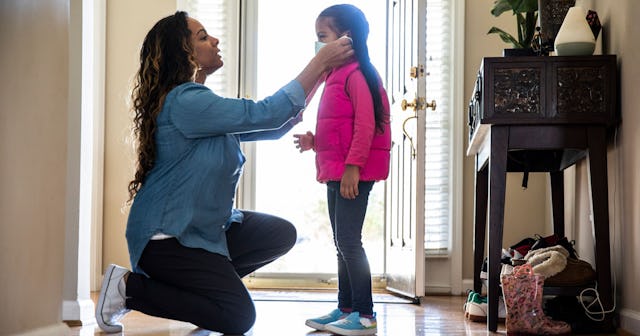How Do We Keep Our Children Safe(ish) From Omicron?

The holidays are over, but the stress has not lessened. Instead, parents are likely more worried and stressed out than they were just a few weeks ago. With the rise of the COVID-19 omicron variant, we are also seeing more cases in children and an increased number of pediatric hospitalizations. This is causing great concern, particularly with parents of children who are not yet fully vaccinated, or those who are too young to be vaccinated. Where do we go from here?
There is a lot of information (and misinformation) out there. It is hard to know what to believe and what not to believe. Additionally, you find conflicting opinions from the medical community — not to mention rapid-fire directives from the CDC — as to what we should be doing.
Many agree that children do best in an in-person learning environment and that we should be getting back to that education model. Having said that, we certainly need to be sure that we are following that big three: hand washing, masking, and social distancing. These, along with vaccination, are the best ways to prevent the spread of all COVID-19 variants, but right now, we are focused on omicron, which has proven to be the most contagious variant yet.
NPR’s Allison Aubrey said, “You know, right now cases among kids are going up significantly. I mean, in the week leading up to Christmas, 200,000 kids tested positive. Now there’s an uptick in hospitalizations.”
David Kimberlin, director of the Division of Pediatric Infectious Diseases at the University of Alabama at Birmingham, told NPR, “We have seen about a 50% increase over the last couple of weeks in pediatric hospitalizations around the country. But our overall numbers compared with prior waves, at least so far, are lower. So it’s a mixed story right now, but I think it’s going to be bad over these next four to six weeks.”
What Should We Do About School?
So what is a parent to do? Do we keep our kids home? Should we test them before they go to school? When do we keep them home from their after-school activities? The answers are mixed. If your child has any symptoms that resemble those of COVID-19, they need to stay home. That is the most important guidance to follow. If you are going to help prevent the spread of disease, you need to keep them quarantined. If you have access to a testing site, get your child tested as soon as possible.
“But if a child has symptoms ‘and if you can’t test them, assume it’s COVID,’” Dr. Paul Offit, director of the Vaccine Education Center at the Children’s Hospital in Philadelphia told CNN. “And then follow all the guidelines — meaning quarantine until asymptomatic and mask for five days after that.”
Are Children Who Are Vaccinated Safer From Omicron Infection Than The Unvaccinated?
The virus is particularly contagious, but parents of vaccinated children should be less concerned about serious complications. Before vaccination, children have a much higher risk of serious illness from any variant, including omicron. But with vaccination availability increasing and more children being vaccinated, the risk has definitely decreased.
“Their sigh of relief should be knowing … that even if a child gets a breakthrough infection, they’re likely only to get cold symptoms from it,” Dr. James Campbell, a professor of pediatrics and pediatric infectious diseases specialist at the University of Maryland, told CNN. “In the past, they didn’t have access to a vaccine or weren’t vaccinated, they would have had a higher risk of potentially being hospitalized,” said Campbell, a professor of pediatrics and pediatric infectious diseases specialist at the University of Maryland.
What Do We Do About Masks?
There are varying opinions on masking. Is it necessary for children who are fully vaccinated to continue to mask? The short answer is, yes. We just don’t have enough information to discern how children can pass the omicron variant to others if they have a breakthrough infection with no symptoms. It is still possible to have the virus and simply not know.
Masks should be well fitted without a lot of air escaping through gaps. If you can get them, N-95 masks are the best choice. Campbell recommends that we talk simply and honestly to our kids regarding why they still need to mask. Explaining that they can still get sick and that masks are the best protection is normally enough to convince them.
“[T]he virus has gotten smarter. And it’s infecting people better. Your vaccine is definitely going to protect,” he said in an interview with CNN.
Do We Cancel the Extracurricular Activities?
It is not necessary right now to cancel all of our kids’ activities. But that could be a possibility in the future. We need to explain to our kids what is happening with the omicron variant, and that while it is our goal to get back to normal as soon as possible, it still might take a while — and prepare them for potential postponements or cancellations.
It is the hope of medical experts that this wave of omicron will pass quickly and while it is still running rampant, parents will continue to get themselves, and their children, vaccinated.
There is no way to know how this virus will last or what the next mutation will look like. It is prudent to continue to follow the CDC’s guidelines for all things COVID-related — and when in doubt, stay home. It could save a life, including your child’s.
This article was originally published on